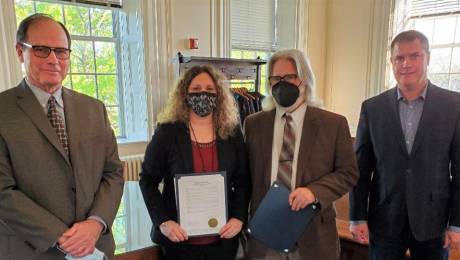Genesee County leaders present plans to distribute $10 million in sales tax/other revenue to towns and villages
Despite the efforts of state representatives in Albany, the Genesee County Legislature’s hopes for enabling legislation to remedy its sales tax and revenue distribution dilemma have been dashed by the Democratic majority in the New York State Assembly and Senate.
"Senator (Edward) Rath and Assemblyman (Steve) Hawley tried everything they could to make this happen, but their colleagues in the majority didn't agree," said Legislature Chair Rochelle Stein on Thursday night.
So, as a result, county leaders have come up with a plan on their own – actually two options depending upon buy-in to updated water agreements from all municipalities – to ensure equitable sharing of revenue to Genesee’s towns and villages.
On Wednesday, Stein and County Manager Matt Landers presented their solution at a meeting of town supervisors and village mayors at the Old County Courthouse.
The Batavian has attained a copy of the discussion outline, which includes the following two options that are on the table:
(1) Distribute $10 million annually to the municipalities in sales tax revenue for the next 38 years as long as all towns and villages sign updated water supply agreements by Aug. 13. As of today, the Towns of Darien and Pembroke and Village of Corfu have yet to sign.
OR
(2) Without universal updated water supply agreements, the county will allot $7 million for annual sales tax distributions to towns and villages, and pass annual revenue distribution resolutions for another $3 million, to allow for the equalization of water surcharge revenue.
SEEKING THE STATE’S HELP
Landers said the county’s current revenue sharing process has created a situation, per state law, where towns with villages inside them have to keep two separate books and have two separate tax rates – an A fund for townwide sales tax that affects everyone and a B fund for sales tax that only affects the services of taxpayers outside the village.
“(State legislation) would have fixed an accounting issue with towns that also have villages,” Landers said.
Unfortunately for the county, state lawmakers didn’t go for the idea.
“The enabling legislation that we were seeking during this last New York State session was to be able to allow the towns that had villages inside them to receive that revenue distribution into their B funds, which was the unintended consequence of revenue distribution,” Stein said. “That failed to get picked up in Albany.”
She said the majority in both chambers “felt the county of Genesee was trying to usurp the power of the state. Therefore, (they were) not interested in helping Genesee County fix that B fund revenue issue.”
ALL IN ONE BASKET?
Now, the county is looking to place all the municipalities back into the sales tax revenue pool.
“The risk to the county in putting everyone back into the sales tax is that we have that water surcharge to help pay for the big water – to bring it into the county,” Stein said. “Without having all 20 towns and villages sign on, we would then most likely get sued by the other 17 that are paying the surcharge – and we would deserve it, let’s put it that way.”
She explained that the $10 million figure that the county is committed to putting into the sales tax agreement would fix the unbalanced A and B tax rate in all but one town – “and that one, through some shared services, could happen very quickly. The $7 million would fix three.”
Should the Towns of Darien and Pembroke and Village of Corfu opt into the water agreement, the county would be able to distribute the $10 million in sales tax revenue to the towns and villages, with the amounts determined by the taxable assessed value of each municipality and equalization rates.
“If those two towns and one village decide not to opt in to the water agreement, the county – in order to equalize the surcharge of the $1.20 per thousand (gallons) for the water users – would have to go to revenue distribution without those three signed agreements (option 2 above),” Stein said.
Calls and emails to Darien Town Supervisor Steve Ferry Jr., Pembroke Supervisor Thomas Schneider Jr. and Corfu Mayor Thomas Sargent for comment were not returned at the time of the posting of this story.
Landers said that he plans to meet over the next couple weeks with government officials in those locations.
“We’re not looking to single out those municipalities,” he said. “I understand they are trying to do the best for their residents.”
A NEW SALES TAX AGREEMENT
In order to make this work, the county needs the Batavia City Council to agree to amend the 40-year sales tax agreement (there are 38 years remaining). The current agreement is only between the county and the city.
“This is a fix that the county has available to us; the county has no skin in this game,” Stein said. “The sales tax agreement is between the City of Batavia and the county, and those are the signatories still to this agreement. We are both amenable to fixing that unbalanced rural property tax situation.”
Landers pointed out that as things stand now, revenue distribution has to go to the town’s A fund; it is not allowed to go to the B fund.
“It would disproportionately hurt rural taxpayers – farms, rural landowners,” he said. “Genesee County legislators agree that unbalance taxation can not continue on rural property taxpayers. Going back to a sales tax model was the only option once the enabling state legislation failed.”
He also credited City Manager Rachael Tabelski for being amenable to revising the sales tax contract.
“It doesn’t impact the City of Batavia one penny, but they understand that if they amend the sales tax agreement it would help our town taxpayers. Rachael was absolutely 100 percent on board with doing this,” Landers said. “Sales tax instead of revenue distribution fixes the problem with rural taxpayers.”
HOW WILL IT WORK?
According to the plan outline, the proposed amended sales tax agreement between the county and city would be dated July 1, 2021 to limit the exposure of towns with villages accounting for voluntary revenue distributions incorrectly in their B funds.
Landers said that revenue distributions would be finished for this year ($5 million has been doled out through June 30), and that two quarterly sales tax payments totaling $5 million will be made before the end of 2021.
“Starting in 2022, quarterly payments totaling either $10 million or $7 million will be distributed. If it is the $7 million figure, then an additional $3 million in voluntary revenue distribution payments will be made,” he reported.
The timeline indicates that a draft of the new sales tax agreement will be sent to the state Comptroller’s Office for review by July 19, and a resolution to cancel the remaining payments for 2021 will be taken to the county’s Ways & Means Committee on July 21. The full legislature would consider that resolution a week later.
The goal is to have an amended signed sales tax agreement sent to the Comptroller by Sept. 14 for formal approval.
HOW MUCH WILL BE DISTRIBUTED?
Following are the projected amounts to be dispersed to the towns and villages, with the first figure based on a $10 million sales tax distribution and the second figure based on a $7 million sales tax distribution:
- Town of Alabama -- $407,659; $285,361.
- Village of Alexander -- $71,006; $49,704.
- Town of Alexander -- $398,581; $279,007.
- Village of Attica -- $28,333; $19,834.
- Town of Batavia -- $1,687,937; $1,181,556.
- Village of Bergen -- $198,962; $139,273.
- Town of Bergen -- $508,589; $356,012.
- Town of Bethany – $408,961; $286,273.
- Town of Byron – $461,621; $323,135.
- Village of Corfu – $137,653; $96,357.
- Town of Darien – $970,992; $679,694.
- Village of Elba – $106,620; $74,634.
- Town of Elba – $360,317; $252,222.
- Village of Le Roy – $718,277; $502,794.
- Town of Le Roy – $822,270; $575,589.
- Village of Oakfield – $199,387; $139,571.
- Town of Oakfield – $299,202; $209,441.
- Town of Pavilion – $543,151’ $380,206.
- Town of Pembroke – $1,020,483; $714,338.
- Town of Stafford -- $649,999; $454,999.









